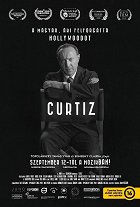Directed by:
Tamas Yvan TopolanszkyCinematography:
Zoltán DévényiComposer:
Gábor SubiczCast:
Ferenc Lengyel, Nikolett Barabás, Lili Bordán, Kata Sarbó, Declan Hannigan, Björn Freiberg, Caroline Boulton, Evelin Dobos, József Gyabronka (more)VOD (2)
Plots(1)
In 1942, as the United States prepares to enter the Second World War, Hungarian-born Michael Curtiz is asked to direct the film, Casablanca. Curtiz, who is Jewish, hesitates, as he is trying to get his sister out of Hungary and an anti-German film directed by her brother could mean danger for her. Later, as Curtiz grapples with the troubled production, his daughter unexpectedly appears on the set demanding to know why her father abandoned her as a child. (Montreal World Film Festival)
(more)Reviews (1)
My Hungarians understand me. It makes sense that they adapted the journey behind the making of one of Hollywood's symbols in Michael Curtiz's own homeland, and it's nice that they didn't turn the directorial matador into a likable pushover at all costs. Apparently, this giant was a choleric and a brute who lost his touch with people. I really like the confirmation of all the theories, that the choice of the now legendary ending of Casablanca was quite a lottery. Unfortunately, I don't agree with the exploration of the close female characters, who never quite settle into the storyline, as well as the artistic "anonymization" of the famous acting duo. Thanks to occasional colorful surprises or a tense atmosphere of creating something great, I believed until the end that I would receive a warmer reward as a fan of the mythologized film, but in that regard Curtiz remained (symbolically) completely indifferent.
()

